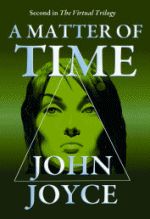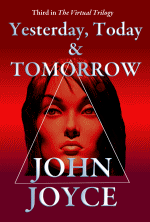As writers, we are required to live not only in the world of the here and now but also in the 'world of the book' which means putting aside the everyday mechanics of living and 'going off' into the fictional reality we are trying to create for our readers.
One danger of this is that we may use this facility to dwell on day-to-day problems that are getting us down at the expense of being able to live and enjoy life in the present. I've had this challenge for years and it came home to me recently during a walk by a beautiful lake when I realised that I'd gone a hundred yards, deep in thought about family problems and not registered any of the beauty around me.
Not only that, but I wasn't one inch closer to solving the problems I was obsessing about.
Spiritual advisors, life coaches and self-help books will advise you to 'live in the present' - but what does that mean in physical terms?
The discovery I made on that walk by the lake was that - if I could imagine my brain as the inside of the car and put all the 'worry' and everything that was not happening right now in the back seat - then I could 'drive my life from the front seat - looking directly out onto the world without all the baggage behind me getting in the way.
This takes a bit of practice and I still find it hard to stop slipping back into the back seat most of the time. But the times when I am 'in the front seat' and experiencing the shapes, colours, sounds and tastes of the real world, and my interactions with the people in it, are quite amazing. The best way I can describe it is like watching a 3D technicolour movie instead of a black and white TV, or the way the hero felt when he took his first shot of the drug NZT in the movie 'Limitless'.
Try it yourself and let me know if it works for you!
Wednesday, May 9, 2012
Friday, April 27, 2012
Producing Stories People Want to Read - 1
Many years ago, when I was starting out as a serious writer, I went to a weekend workshop with John Sherlock – a famous Hollywood script doctor. One of his main take home messages was that, for all my romantic notions of ‘being in the world of the novel’ as the prime motivator to write, writing is a craft, producing product, which needs to be saleable to the customer - i.e. the reader.
Like any craft, so much can be taught and so much more is a given gift. This explains why many writers only write (or have inside them) one novel. As professional writers, said Sherlock, you must produce stories; they are the product, just as another craftsman produces chairs, or pottery. To produce product you have to understand the craft of transforming an idea into a saleable story.
And to make a story saleable - You MUST put the customer (i.e. the Reader) First
This came home to me again some years later when I read a book by Jean Z. Owen who said ‘the writer takes an important step when he realises that THE ONLY IMPORTANT PERSON IS THE READER. The inability of would-be writers to shift the locus of emphasis from themselves to their readers has resulted in more literary failures than all other reasons added together . . .’
According to Mr. Owen, a professional writer MUST:
• ‘Master techniques so that THE READER finds the writing clear and easy to assimilate.
• Learn not to strut in prose because this bores THE READER.
• Sacrifice timidity and force himself to write scenes with emotional impact because this is what THE READER seeks in fiction.’
In my next blog, I’ll pass on some of the tips I learned over the many years I’ve been writing on how to put the reader first and hopefully, produce stories that people will actually want to pay good money to read. However, I make no claim whatsoever that I personally can actually DO this - you THE READER will have to be the judge of that!
Looking forward to hearing from you.
Like any craft, so much can be taught and so much more is a given gift. This explains why many writers only write (or have inside them) one novel. As professional writers, said Sherlock, you must produce stories; they are the product, just as another craftsman produces chairs, or pottery. To produce product you have to understand the craft of transforming an idea into a saleable story.
And to make a story saleable - You MUST put the customer (i.e. the Reader) First
This came home to me again some years later when I read a book by Jean Z. Owen who said ‘the writer takes an important step when he realises that THE ONLY IMPORTANT PERSON IS THE READER. The inability of would-be writers to shift the locus of emphasis from themselves to their readers has resulted in more literary failures than all other reasons added together . . .’
According to Mr. Owen, a professional writer MUST:
• ‘Master techniques so that THE READER finds the writing clear and easy to assimilate.
• Learn not to strut in prose because this bores THE READER.
• Sacrifice timidity and force himself to write scenes with emotional impact because this is what THE READER seeks in fiction.’
In my next blog, I’ll pass on some of the tips I learned over the many years I’ve been writing on how to put the reader first and hopefully, produce stories that people will actually want to pay good money to read. However, I make no claim whatsoever that I personally can actually DO this - you THE READER will have to be the judge of that!
Looking forward to hearing from you.
Monday, April 23, 2012
Why Do Writers Write? - 2
I think that one of the most wonderful things about being a writer is to be able to step out of the ‘real’ world we all live in and into the world of the book you are creating at the time.
If the creative process is really working for you, you’ll be able to ‘see’ the scenes in your mind, talk to the people in them and actually BE in the ‘world’ of the book.
That's a tremendous draw for me as a writer and, I suspect for many other creative people. There have been times when I’ve started on a scene – simply writing what I’ve seen in my head - and I could be there at the keyboard for two hours and look up at the clock think I’ve only been there ten minutes because I’ve been so completely absorbed.
When you get it right it really is an incredible experience and I think that's why a lot of creative people who feel frustrated with their art are vulnerable to getting lost in drugs and alcohol. Perhaps because drugs and alcohol appear to transport you out of the present in a similar way, although not to the depth and the breadth and the emotional return that actually being in the creative process can bring, and with far more dangerous consequences.
Sometime, if you’re lucky, the book takes on a life of its own and you don't have control over it. When this happens you’re basically commentating on what you see and feel in your head. You may have created a purely fictional character but there’s a point when they go beyond being like a matchstick man of ideas that you have to having a life of their own and starting to actually talk to you.
So . . . back to the keyboard!
Friday, April 20, 2012
Great Week at the London Book Fair
'Fire & Ice' - my new Cold War novel based around the Cuban Missile Crisis - was on display at the London Book Fair in Earl's Court last week. This is a truly massive book fair, which this year featured a great deal of interest from China and a very useful range of talks and seminars, as well as a wealth of networking opportunities.
'Fire & Ice' featured on the Independent Publisher's Guild (IPG) stand under the Spindrift Press banner and I'm very grateful to Bridget Shine and all the other members of the IPG team who made it possible. I was able to meet a number of useful contacts in the hard-copy book distribution and marketing area, as well as in the quickly growing e-book area.
As a first-time visitor to the London Book Fair, I was blown away by the scale of it all (although those who've been to the Frankfurt Book Fair tell me that this even is SIX TIMES as big as the London Book Fair!!!). Even the 'rights area' upstairs, where agents meet clients to discuss the sale of overseas rights to books and where I met my own agent, seemed to feature an endless sea of tables in what looked like the biggest 'speed dating' agency in the world.
I would strongly recommend the London Book Fair as a fantastic introduction to the world of books for any author or publisher, but wear a pair of comfortable shoes and take a break every hour or so by going outside so that you're not completely overwhelmed by it all!
Fire & Ice on the IPG Stand
'Fire & Ice' featured on the Independent Publisher's Guild (IPG) stand under the Spindrift Press banner and I'm very grateful to Bridget Shine and all the other members of the IPG team who made it possible. I was able to meet a number of useful contacts in the hard-copy book distribution and marketing area, as well as in the quickly growing e-book area.
One corner of one of the two halls at the London Book Fair
As a first-time visitor to the London Book Fair, I was blown away by the scale of it all (although those who've been to the Frankfurt Book Fair tell me that this even is SIX TIMES as big as the London Book Fair!!!). Even the 'rights area' upstairs, where agents meet clients to discuss the sale of overseas rights to books and where I met my own agent, seemed to feature an endless sea of tables in what looked like the biggest 'speed dating' agency in the world.
Just one section of the 'Rights Area' at the London Book Fair
I would strongly recommend the London Book Fair as a fantastic introduction to the world of books for any author or publisher, but wear a pair of comfortable shoes and take a break every hour or so by going outside so that you're not completely overwhelmed by it all!
Monday, April 2, 2012
Why Do Writers Write?
Let's face it - writing is a lonely and largely thankless profession. Not only do you have to create a unique idea out of thin air, but you then have to nurture and develop it over sometimes years of effort, only to see it rejected for publication again and again and again.
So what's the payoff?
For me, the main reason I write is to create 'worlds'. By that, I mean spending time completely immersed in the world of the book with the characters, the locations and the situations. On the occasions when this has happened to me, time has literally flown and the work itself has hardly required editing at all.
Anyone who has read the excellent book 'Flow' by Mihaly Chikczentmihaly or experienced it themselves will know what I mean.
Perhaps that is why so many great writers come to a sticky end through drink and drugs - they've experienced the 'flow' with their writing and so - when that flow dries up and their ideas don't come any more - they seek to recapture that feeling in other ways.
Any thoughts anyone?
So what's the payoff?
For me, the main reason I write is to create 'worlds'. By that, I mean spending time completely immersed in the world of the book with the characters, the locations and the situations. On the occasions when this has happened to me, time has literally flown and the work itself has hardly required editing at all.
Anyone who has read the excellent book 'Flow' by Mihaly Chikczentmihaly or experienced it themselves will know what I mean.
Perhaps that is why so many great writers come to a sticky end through drink and drugs - they've experienced the 'flow' with their writing and so - when that flow dries up and their ideas don't come any more - they seek to recapture that feeling in other ways.
Any thoughts anyone?
Subscribe to:
Comments (Atom)






